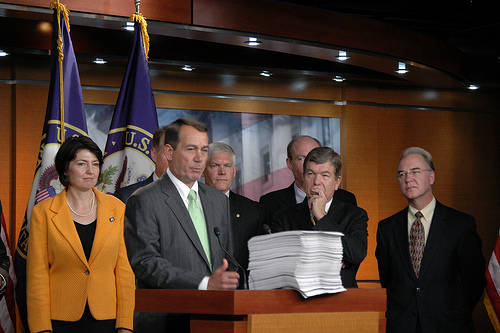I have no idea how the Supreme Court will rule on Thursday in the Obamacare case. So instead I’ll tell you how I’d rule.
You probably figure that’s easy: I’d vote to uphold the law. And you’re right. I would. But I’d go a step beyond that, because I think the justices really do owe it to Congress and the rest of us to articulate a limiting principle that defines the scope and reach of the Commerce Clause.
To explain this, let’s back up a bit. As most everyone knows who’s been following this case, the Obama administration contends that the Commerce Clause gives Congress the authority to implement an individual mandate that requires everyone in the country to buy health insurance if they don’t already have it. In a nutshell, the argument is this: (a) the healthcare market is clearly interstate commerce, (b) Congress has the power to regulate interstate commerce, therefore (c) Congress has the right to regulate the healthcare market, and (d) the mandate is part of a reasonable legislative scheme for regulating healthcare.
Critics, however, argue that forcing people to purchase a commercial product goes beyond Congress’s power. The problem is this: there’s simply nothing in the text of the Constitution, or in prior precedent, that makes this distinction. The Constitution says Congress has the power to regulate commerce “among the several States.” It doesn’t say Congress has the power to regulate commerce “among the several States as long as nobody is ever required to buy something.” Suddenly plucking this distinction out of thin air without a shred of prior warning, just in time to overturn a major piece of legislation that conservatives happen to dislike, would be outrageously partisan.
But what should be the limit on Congress’s commerce power? In Wickard vs. Filburn, which has controlled Commerce Clause jurisprudence since 1942, the court was asked to decide whether Congress could bar a farmer from growing wheat for his own use. The Roosevelt administration argued that even though this was obviously activity within a single state, it affected the amount of wheat the farmer bought on the national market — a market that Congress had the right to regulate. So unlike the Obamacare case, where there’s really no conflict with the text of the Constitution to begin with, Wickard clearly required a court ruling. The black letter text of the Constitution gives Congress the power to regulate only interstate commerce, and the question at hand was precisely whether Wickard’s private wheat crop did, in fact, constitute a meaningful impingement on interstate commerce. The court had to address this question, and it ruled that Wickard’s private activity did indeed affect interstate commerce and that therefore Congress had the authority to regulate it.
My view is that the individual mandate is way inside the boundaries set by Wickard. Not only did Wickard present a legitimate question suggested by the actual wording of the Constitution, but the court ruled that virtually anything that affects interstate commerce, even in a small way, can be regulated by Congress. In the Obamacare case, there’s nothing in the text of the Constitution that demands a ruling, and in any case the mandate affects interstate commerce far, far more than Wickard’s wheat growing ever did.
So the mandate falls well within the authority of Congress. Still, it would be nice to know just how far that authority extends. The Supreme Court traditionally tries to tailor its decisions narrowly, but in this case it really ought to go further. It’s obvious that several of the justices think there ought to be some limit a little more stringent than Wickard, and if that’s what they think they shouldn’t keep Congress guessing about it. The legislature has a reasonable right to know what rules they have to work under.
Ideally, then, that’s what I’d like to see the court do on Thursday: uphold Obamacare, but at the same time enunciate some reasonably concrete limiting principle to Congress’s Commerce Clause power. We shouldn’t have to keep playing guessing games about this.













